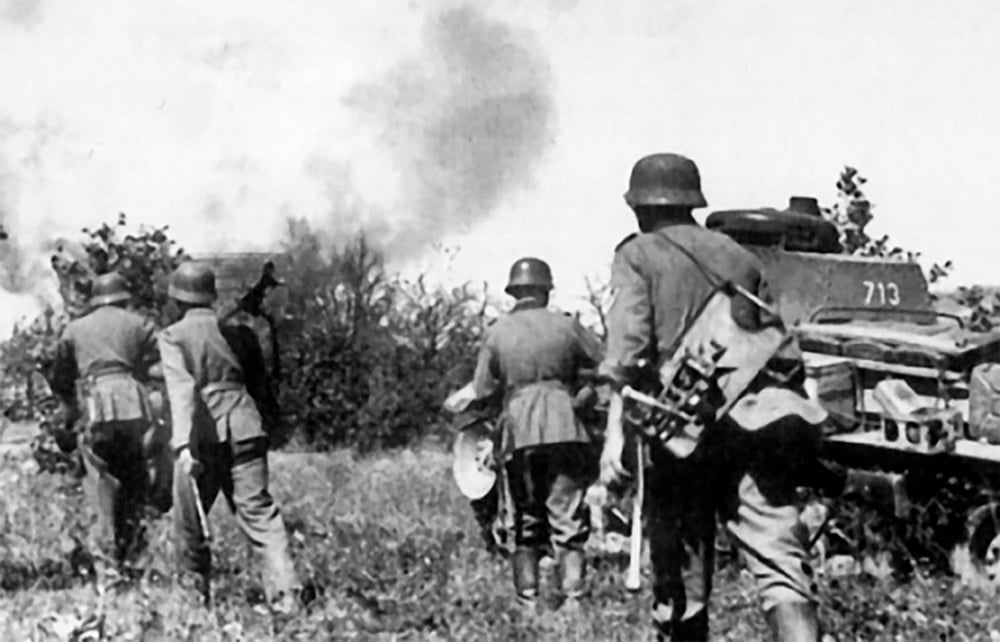
(Credit: Wikipedia)
Part IV
Justification for Murdering Every Jewish Man, Woman and Child
In a speech on October 6, 1943, to the Reichsleiter (the second-highest political rank of the Nazi Party, NSDAP, next only to Hitler’s office) and Gauleiter (regional Nazi party leaders), Heinrich Himmler, Reichsführer-SS, responded to the question of the necessity of murdering every Jewish woman and child. “I did not consider that I had the right to eliminate them—that is to kill them or have them killed—and to let their children grow up to become avengers against our own sons and grandsons. The difficult decision had to be taken to have this people disappear from the face of the earth.”
The theme of remaining decent above all else was reiterated by Himmler to a group of commanders during the war, observes German historian Hans Buchheim. “It is hideous and frightful for a German to see such things,” Himmler acknowledged. “It is so, and if we had not felt it to be hideous and frightful, we should not have been Germans. However hideous it may be, it has been necessary for us to do it, and it will be necessary in many other cases. If we lose our nerve now, we shall pass weak nerves on to our sons and grandsons.”
Himmler had no doubt that only a very select group of committed individuals was capable of executing this sacred mission, writes historian Yaacov Lozowick. “These measures in the Reich,” Himmler said, “cannot be carried out by a police force made up solely of bureaucrats. A corps that had merely sworn an oath of allegiance would not have the necessary strength. These measures could be borne and executed only by an extreme organization of fanatic and deeply convinced National Socialists. The SS regards itself as such and declares itself as such, and therefore has taken the task upon itself.”
Until around mid-1942, no individual was required to join any part of the SS, Buchheim asserts. Enlistment was completely voluntary. Furthermore, contrary to popular myth, “the object of every patriotic and military inclined young German was [not] to enter the armed SS formations.” Those who joined the SS, the “régime’s praetorian guard,” were publicly committing themselves to the Reich and placing themselves explicitly at their service. They generally knew “the connection between the SS and the Gestapo and between the SS and the concentration camps,” although possibly not in complete detail.
Buchheim claims no one who joined the SS could have known that one day he would be ordered to participate in systematic mass murder; nonetheless, he must have been cognizant he was joining “an organization where he would have to carry out illegal orders.” In other words, “entry into the SS … implied this risk, eyes wide open.”
Until the beginning of the war, a person could resign from the SS. In 1937 and 1938, there were many resignations. In 1937, 7,900 were released. Although one could not be punished or suffer physical harm for resigning, it did entail a degree of nerve. As Buchheim points out, “Considerable courage is required to make oneself ‘unacceptable’ to one’s social environment and sever one’s link to it.”
During the war, Buchheim said it was not possible to be released from the Waffen-SS (the combat branch), because it counted as military service, and all concentration camp staff were Waffen-SS. Resignation from the SS was also forbidden. Their only option was to ask for a transfer to another branch, detachment, or to the front, which was clearly realistic. During the war, the police, which suffered from a serious shortage of personnel, were not permitted to resign. Rarely, would they be granted permission to transfer to the Waffen-SS.
Winning the War
Historian Saul Friedländer notes that Joseph Goebbels, Reich minister of propaganda, attended this day-long Gauleiters’ conference on October 6 and noted, “As far as the Jewish question is concerned, he [Himmler] gives a very unvarnished and frank presentation. He is convinced that we can solve the Jewish question throughout Europe by the end of this year. He proposes the harshest and most radical solution: to exterminate the Jews root and branch [Kind und Kegel]. It is certainly a logical solution, even if it is a brutal one. We have to take responsibility for completely solving this issue in our time. Later generations will certainly not handle this problem with the courage and the ardor that are ours.”
Friedländer said that on June 15, 1941, a week before the Germans began their offensive against the Soviet Union, Hitler summoned Goebbels to the Reich Chancellery, ostensibly to secure the support of his most fervent subordinate. “We stand on the eve of an unparalleled victory,” Goebbels proclaimed. Unexpectedly and uncharacteristically, Hitler commented: “Whether we are right or wrong, we must win. This is the only way. And it is right, moral, and necessary. And once we have won, who will ask us about the methods? In any case, we have so much to account for, we must win; otherwise our whole people—and we in the first place, and all that we love—would be erased.” In other words, at that point, there was no way back.
Guidelines for Behavior
Buchheim points out that to ensure that the destruction of the Jews remained under control and discipline maintained, Himmler issued an order on August 16, 1935, prohibiting any person from acting independently against the Jews. The “solution of the Jewish question,” Himmler declared, “is the business of the Führer and not of individuals … Even the most minor contravention of the order” would be “punished by immediate dismissal from the SS.”
On May 13, 1941, Hitler signed the “Directive on the Exercise of Jurisdiction and Particular Measures by the Troops,” historian Peter Longerich said, which stated that criminal transgressions against the civilian population by members of the Wehrmacht in occupied Soviet areas would stop routinely being disciplined by Wehrmacht courts, but should be adjudicated by the courts only in well-defined situations. Furthermore, military courts would cease being responsible for “criminal offenses committed by enemy civilians.” Troops were to punish them promptly as soon as they happened.
Buchheim added that when a SS Untersturmführer (Lieutenant) viciously murdered hundreds of Jews by himself, the judgment against him read, in part: “The accused should not be punished for his actions against the Jews as such. The Jews must be annihilated, and no tears need to be shed over any of the Jews whom the accused killed.” Nevertheless, as essential as it was to destroy the German “people’s worst enemy,” it is “not the German manner to use Bolshevist methods to do so.” The murderers had to remain decent while a “criminal act” was being carried out, even in their fanatical pursuit of wiping the Jews off the face of the earth.
Dr. Alex Grobman is the senior resident scholar at the John C. Danforth Society, a member of the Council of Scholars for Peace in the Middle East and on the advisory board of the National Christian Leadership Conference of Israel (NCLCI). He has an MA and PhD in contemporary Jewish history from The Hebrew University in Jerusalem.








